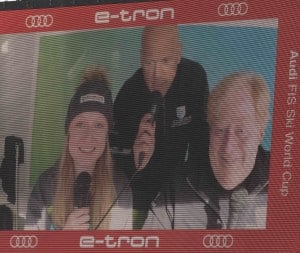By Katy Savage
KILLINGTON— It was time to rowdy the crowd. Up next was 25-year-old Foreste Peterson, a California native and recent Dartmouth College graduate.
“On your feet, on your feet,” announcer Doug Lewis told the 18,500 fans at the Killington World Cup on Saturday. “Make some noise for Forestttttttte!”
“She’s struggling a little bit, but let’s see if she can pull it together,” chimed in 17-year-old Anja Kroon.
Foreste Peterson finished 49 seconds off the leader’s pace.
Kroon, a senior student at Killington Mountain School sat in the announcer’s booth on Saturday, between Lewis, a two-type Olympian and former World Cup alpine ski racer and Peter Graves, 66, a 40-year veteran of announcing World Cups, championships and Olympic games. She and Tanner Schultz, another senior KMS student, were selected to announce the event by NBC. They tried out by commenting on a muted video of last year’s World Cup race in Killington.
“You could tell by their energy and passion that they were the best,” said Lewis.
Kroon announced the skiers in the giant slalom event on Saturday morning while Schultz announced part of the slalom race on Sunday morning.
Kroon was only scheduled to announce a handful of skiers, but the NBC television producer let Kroon stay in the booth to announce about half of the racers in the first giant slalom race.
“She knocked it out of the park,” said Lewis. “I think she was naturally someone who wanted to share her passion for the sport with the group.”
The weather was sunny and warm on Saturday, creating gripy conditions on the course. Some of the young skiers pushed harder and took more chances as they came down Superstar to the roaring crowd.
Foreste Peterson finished 49th with a time of 57:04–not enough to qualify her to move on and ski a second run, but still a great job, Graves told the audience and Lewis started to chant “U-S-A, U-S-A.”
Kroon encouraged the crowd to cheer, especially for the Americans. She told the crowd when the racer was off pace and when they made mistakes.
Kroon, who speaks English, Dutch and German, also taught the crowd a new German phrase—“hop schweitz hop,” which means “let’s go!”
The weather on Saturday created perfect skiing conditions. “It’s easier when it’s gripy because there’s more room to adjust to whatever happens,” Kroon told the crowd. “You can see the snow getting softer—you can see the racers really try to attack it,” she continued.
Kroon took turns commenting with Lewis and Graves. When one stopped talking, another quickly took over.
They communicated with hand and eye signals.
“It was constantly go, go, go,” said Kroon after the event. “When you see something you had to say something and hope that what you said came out in full sentences.”
Kroon, who grew up in New Jersey, lives in Killington to train from skiing in the winter months.. Kroon, a former ballerina, said she’s used to performing.
“I have a pretty loud voice and I have no problem organizing or performing for people,” she said.
Heavy fog on Sunday morning made announcing difficult for 17-year-old Schulz.
It was nearly impossible for the announcers to see the racers—and for the racers to see the course.
Schulz grew up in Rhode Island. He surfs in the summer and skis in the winter.“My dream is to take skiing as far as I can,” he said.
NBC and Killington Resort push each year to make the Womens’ World Cup bigger and better. The addition of KMS student announcers was part of that.
“It’s one of the things that I think makes Killington so fantastic,” said Graves. “Every year they’re trying to do something more. Every year, we’re trying to be more interactive with the crowd.”
Both Schultz and Kroon were confident between veterans Graves and Lewis.
“It’s not easy to walk into a booth like that and ot that have that kind of poise–it’s like being thrown into the major leagues without a lot of preparation,” said Graves, who started announcing sport events in college. He announced his first Olympic games in 1980. Lewis’ first time announcing was for championships in Vail, Colorado. “I remember my first time–you never know when to talk you never know when to shut up. You never know what to say,” added Lewis.
Graves and Lewis are both native Vermonters. Lewis grew up in Middlebury and moved to Park City, Utah, last June, while Graves lives in Thetford.
They have been announcing together at races around the world for 20 years. Lewis is the analyst, critiquing the racers as they come down, while Graves is the host, catering to the audience.
“It’s never been work. It’s so easy. We have a rhythm that I’ve never had with anyone else,” said Lewis. “It’s a dance.”
Graves, who was never good enough to make a U.S. Ski team, said he found his knack in announcing.
“In doing announcing, you have a real interaction with the fan and it makes me feel good when I see them up on their feet and clapping–and to think we had something to do with that,” he said.
Graves starts preparing for announcing in June and July. He writes biographies of each athlete on notecards so they are ready to go for the season.
“We really want to give everybody their moment in the sun as best we can,” he said.
Both Graves and Lewis were packing their suitcases on Monday after the World Cup. They were traveling to Beaver Creek, Colorado, where they would be announcing men’s speed race events together.
Announcing in their home state with first-time announcers, however, was a special moment, both said.

Anja Kroon, 17, took over announcing for the World Cup




